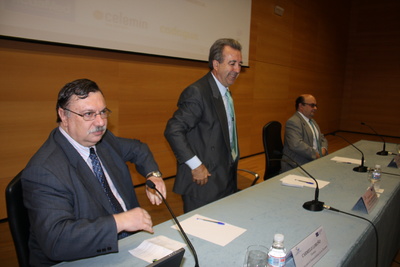CONFERENCE TOWARDS SUSTAINABLE WATER IN SPAIN. Integrated water resources management.
Over 200 experts have gathered in Murcia to discuss current water issues at a conference (22 and 23 June 2010) organized by the ISR (Institute for Sustainable Resources) and the Foundation IEA (Euro Mediterranean Water Institute).
The theme of the conference is "Towards Sustainable Water in Spain" and has enjoyed the participation of 35 speakers from the state and regional Hydraulic Administration, as well as from academic and professional scopes.
Among the main conclusions of this seminar the usefulness of the model of integrated water resources management is highlighted as a tool to address water issues so as to optimize the use of the resource in relation to economy and environment, and to avoid dispersion of competences under political criteria unrelated to the physical reality of the river basin.
With regard to water use in areas of scarcity and drought in the east and southeast of Spain, the high use efficiency achieved has been highlighted, admitting that there is little margin for improvement in these practices, as well as the high profitability of agriculture (unsubsidized and highly technified) and its contribution to job creation and economic value.
Groundwater and its tendency to unsustainable exploitation for 50 years has been one of the fundamental keys of the meeting, highlighting the need for seeking a solution to stabilize water supply in order to prevent progressive and continuous deterioration of the aquifers, which represent one of the biggest environmental problems today.
Desalination has also been analyzed in its economic and environmental aspects, coming to the conclusion that this non-conventional resource has turned into an important remedy for various domestic and industrial uses, although it can generate serious doubts about its sustainable use for agriculture in terms of energy and environmental cost.
Finally, we analyzed in detail the role of the Water Framework Directive as a reference for legislation and water policy in the EU, having reached the conclusion that it is a valuable policy tool but insufficient to focus exclusively on environmental degradation of water bodies and aquatic ecosystems. Consequently, this directive needs a renovation and widening that includes in an integrated way quantitative problems as scarcity, drought or climate change. Thus it will serve as a genuine framework for political action and the development of standards and plans across the EU.
Regarding climate change, it has been revealed the existing uncertainty and the need, nevertheless, to take adaptive measures at all levels. Specifically, it was suggested the need for short-term scenarios that may be effective in taking policy decisions for the immediate future.


